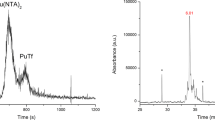Abstract
THE ability of the placenta to discriminate between strontium and calcium has been demonstrated by Comar et al. in double tracer experiments using rats and pigs1. They found that the strontium/calcium ratio of the fœtus was considerably less than that of the mother. In the case of rats, the strontium/calcium ratio of the fœtus was 0.55, and 0.65 times that of the mother, while for rabbits the fœtus had a strontium/calcium ratio 0.49 times that of the mother.
This is a preview of subscription content, access via your institution
Access options
Subscribe to this journal
Receive 51 print issues and online access
$199.00 per year
only $3.90 per issue
Buy this article
- Purchase on Springer Link
- Instant access to full article PDF
Prices may be subject to local taxes which are calculated during checkout
Similar content being viewed by others
References
Wasserman, R. H., Comar, C. L., Nold, M. M., and Lengemann, F. W., Amer. J. Physiol., 189, 1 (1957).
Bryant, F. J., and Loutit, J. F., Rep. No. AERE-R 3718 (London, 1961).
Dixon, W. J., Ann. Math. Stat., 22, 68 (1951).
Comar, C. L., Ann. N.Y. Acad. Sci., 64, 281 (1956).
Author information
Authors and Affiliations
Rights and permissions
About this article
Cite this article
RIVERA, J. Strontium – Calcium Discrimination by the Human Placenta. Nature 200, 269–270 (1963). https://doi.org/10.1038/200269a0
Issue Date:
DOI: https://doi.org/10.1038/200269a0
This article is cited by
-
The effects of benzodiazepines on aggression: Reduced or increased?
Psychopharmacologia (1973)
Comments
By submitting a comment you agree to abide by our Terms and Community Guidelines. If you find something abusive or that does not comply with our terms or guidelines please flag it as inappropriate.



